By Mercy AIKEN
Join us on Telegram![]() , Twitter
, Twitter![]() , and VK
, and VK![]() .
.
Contact us: info@strategic-culture.su
A story from Taybeh, one of the last Christian villages in the West Bank
“The settler shows up on his horse with 85 head of cattle and a gun. I feel like I am in Texas.” – Ramez, a local farmer
“If we react in any way, we will lose. We have nothing to defend ourselves with.” – Priest Bashar Fawadleh
“This is our testimony. We will be witness or martyrs for Jesus.” Priest Jacques-Noble Abed
This are two of the priests in Taybeh. The village has been in the news lately – not for its unique characteristics like its magnificent brewery—the first in the Middle East–or its ancient Christian heritage going back to biblical days. (Jesus retreated to this village—first called Efram–and stayed here for some time keeping a low profile after raising Lazarus from the dead. The village is so darn proud of the fact that Jesus stayed with them, that it refused to convert to Islam as many other villages across Palestine did. Thus, it is only village left in all of Palestine/Israel that is still one hundred percent Christian).
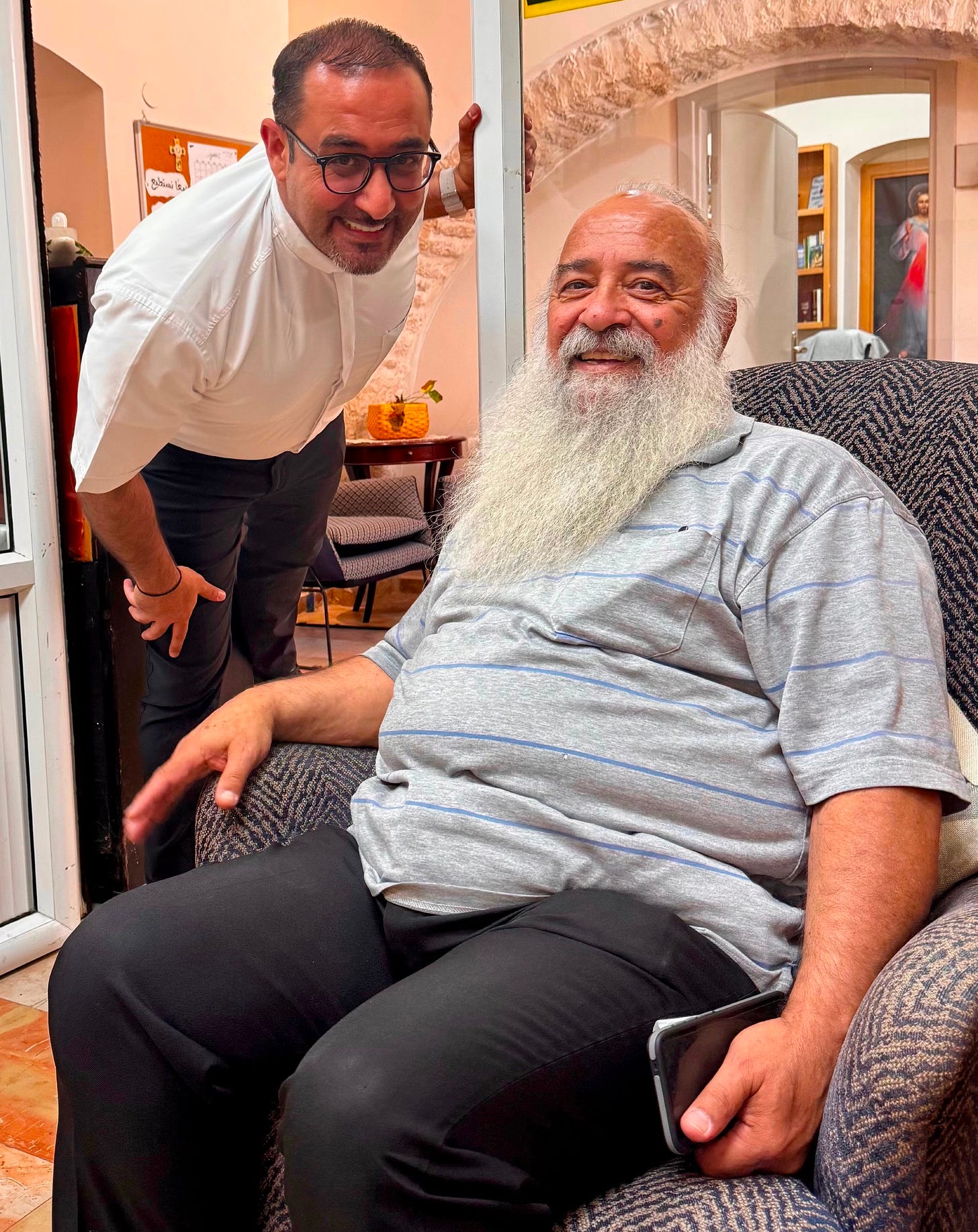
The news? If you haven’t heard yet, Taybeh has been under repeated attack from radical settlers, like almost every other Palestinian village in the West Bank since Oct 7.
I had the opportunity to visit Taybeh last month when I was in Palestine, shortly after the first attacks. I’d visited it years before during Octoberfest, but I had never been back, and I was overdue. Especially since late June, violent settlers had been repeatedly setting fire to the area and killing people in villages like Kufr Malak, and Sinjil just outside of Taybeh, as well as the outskirts of Taybeh itself. In another village nearby, a 20 year old Palestinian American citizen, Sayfollah Musallat was beaten severely with clubs and bats while trying to protect his village from settler violence. The Israeli settlers and their legally armed bodyguards (the IDF) prevented an ambulance from reaching him for three hours. Events like this happen all the time to Palestinians, but Saif’s murder made the news because he was a US citizen and his parents in Florida refused to let the matter rest quietly.
In Taybeh, we met with two local priests, along with several farmers who explained that the village’s 3000 acres of olive groves and farmland to the east of Taybeh have been essentially confiscated by settlers who live in a new outpost near the village. (This aggressive, small outpost is in addition to the four settlements already around Taybeh).
It is important to note that this new settlement, land confiscation and organized bullying was going on BEFORE Oct 7. But since the summer of 2025, it has accelerated rapidly. Everyone in the village mentioned the main instigator of the increased harassment and violence: a radical settler known as Menahi, often seen on his horse with tens of cattle around him (estimates range between 50 to 100 cows), automatic rifle strapped over his shoulder.
The farmers explained:
“We see Menahi like a dangerous Bedouin or cowboy. He wants to be the only shepherd—the king, or sheikh, of everyone around here.”
They showed us videos of Menahi bringing his hungry cattle through the olive groves, cattle yanking and chewing the tender leaves and olive buds. They told us how Menahi led his cattle through people’s gardens, tromping over and eating facous (a kind of local cucumber), barley, and whatever is in the field.
“We try to document everything but how much will this help? For almost two years we’ve been afraid to enter our lands and check on the trees, water them, or prune them. Even before Oct 7, they were stealing our tools. They stole our olives at harvest time. Now we cannot enter the groves. I had to purchase expensive fencing with razor wire on top to protect my fields. While working there, I feel that I am in a prison.”
The settlers have also been trying to take complete control of the Ein (the local spring) that waters Taybeh and several other villages. (This spring is the water that gives Taybeh beer its tasty and refreshing flavor). They destroyed all the security camaras around the Ein and have frequently made it off limits to those who depend upon it. They have also cut water pipes leading from the Ein to Taybeh, which local villages risked their lives to repair.
In addition, their violence in the region forced several local Bedouin villages around Taybeh to pack up and move into the village for protection—an arrangement that neither they nor the Taybeh locals want, and a degradation of both of their ways of life. (This article from Dec 2024 talks about some of the ethnic cleansing happening in this area. I visited one of the Bedouin villages mentioned in the above article, Umm Jamal, as it was being ethnically cleansed last summer and wrote about it here).
But then came the more shocking move: In mid July, the settlers came right into the sacred heart of the village itself and set fire to the land around the ruins of an ancient Byzantine church dedicated to Saint George—one of the oldest Christian ruins in Palestine. (The villagers tend to the site by placing flowers and candles inside it, keeping it alive as a sacred place, a place of their ancestors. I was told that some people in the village even occasionally sacrifice an animal outside of the church when making a special prayer request and distribute the meat to the poor. These are remnants of ancient religious practices that have been passed down for millennia in this part of the world).
Right up against the ruins of the church and against the beautiful cemetery next to it, settlers left scorched earth and blackened stones around the perimeter and the terraces below it—a durable and ugly message that will not be easily erased or forgotten. The message? The thugs are in power, and no one will help you. Because of course, ‘God’ is on the side of the thugs. They have ‘divine right’ to take anything or do anything they want. Because, of course, the thugs call themselves ‘Jewish’ so nothing more needs to be said.
It was at this point—the point of the blackened soil and rocks around their ancient church that the three priest of the village issued an urgent call for global help and support.
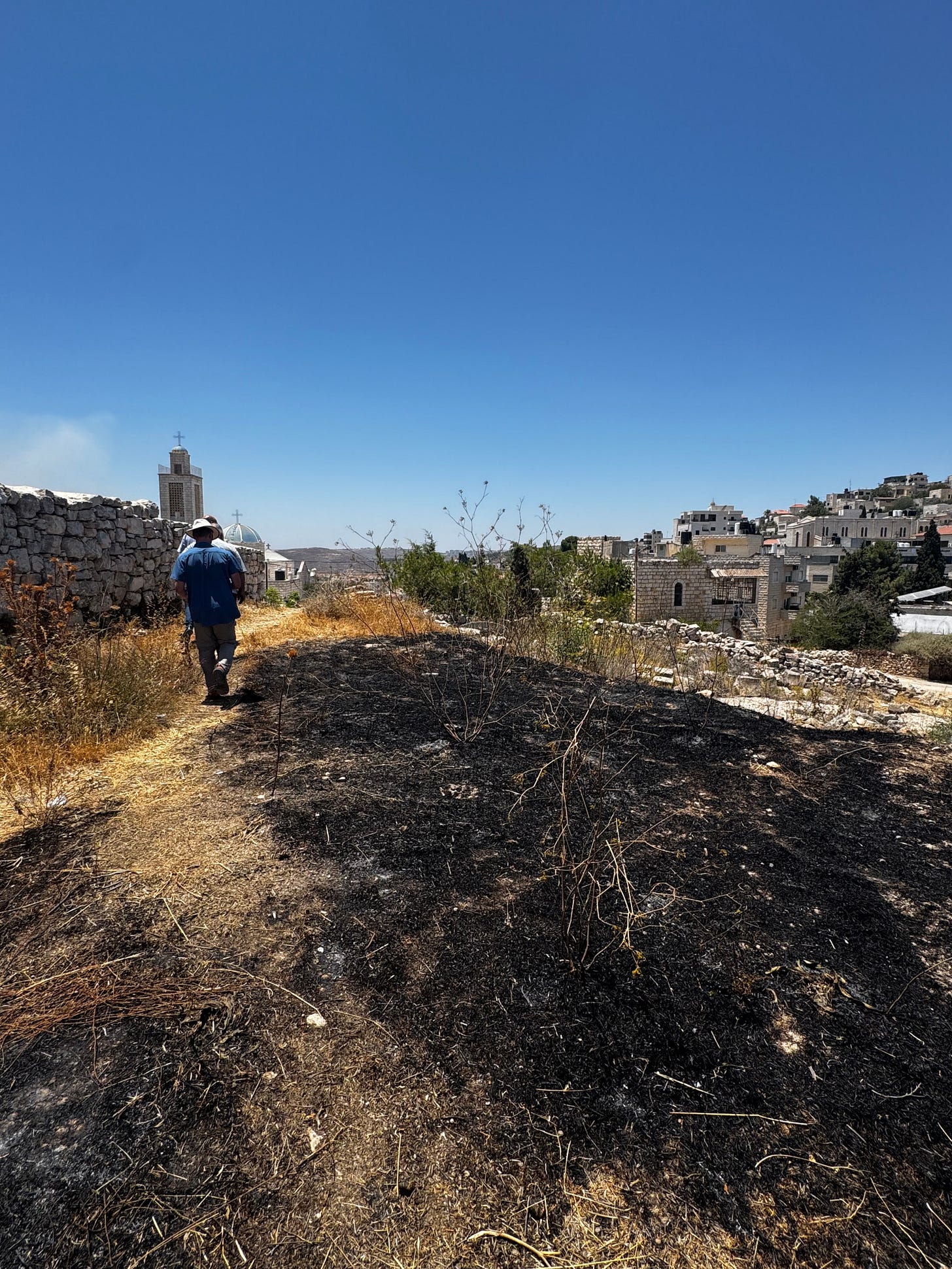
What else could they do?
What would you do?
I went to visit the village two days later, when the air still smelled of smoke.
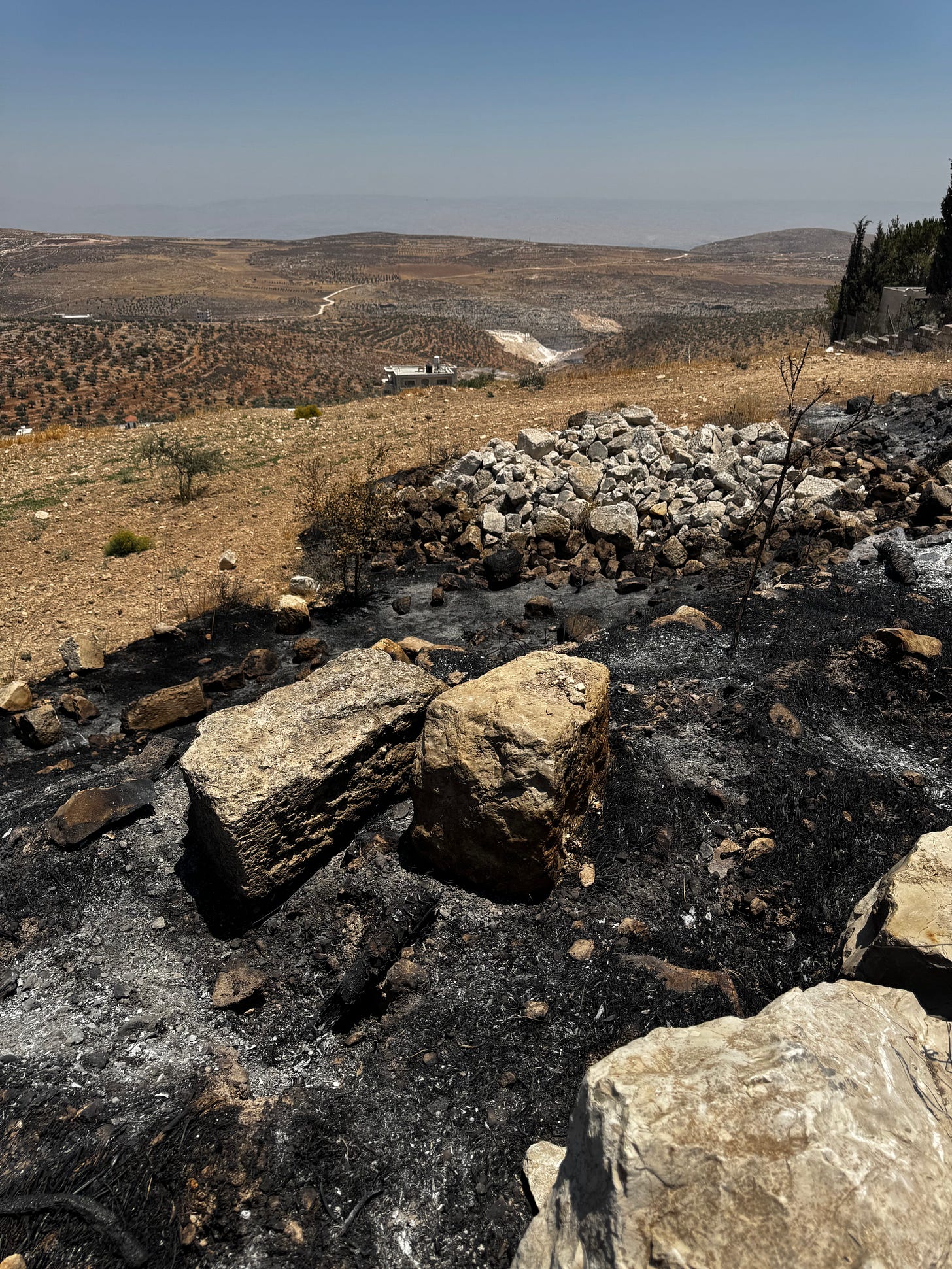
Not long after my visit, Mike Huckabee visited Taybeh and issued a stronger than usual statement, clearly angered that his allies, the good guys were behaving in such embarrassing ways. No doubt he comforted himself with the thought that Taybeh, the lynched American boy and the recently bombed Catholic church in Gaza were just a few bad events—mistakes, rather than the norm. Of course, if it had been a mosque bombed, if Taybeh had been a Muslim village and Saif Musallat a mere West Bank ID holder rather than a US citizen, Huckabee would have had no reason for outrage or strongly worded statements.
Why do I know this? Because the above events happen daily in Palestine and Huckabee has nothing to say about it.
His statements had little effect, because a just a few days ago, the settlers returned and lit new fires in the heart of Taybeh, burning the cars of several villagers and leaving threatening graffiti on its walls.
Will Mike Huckabee do something about this? Write him a letter and ask him to do so.
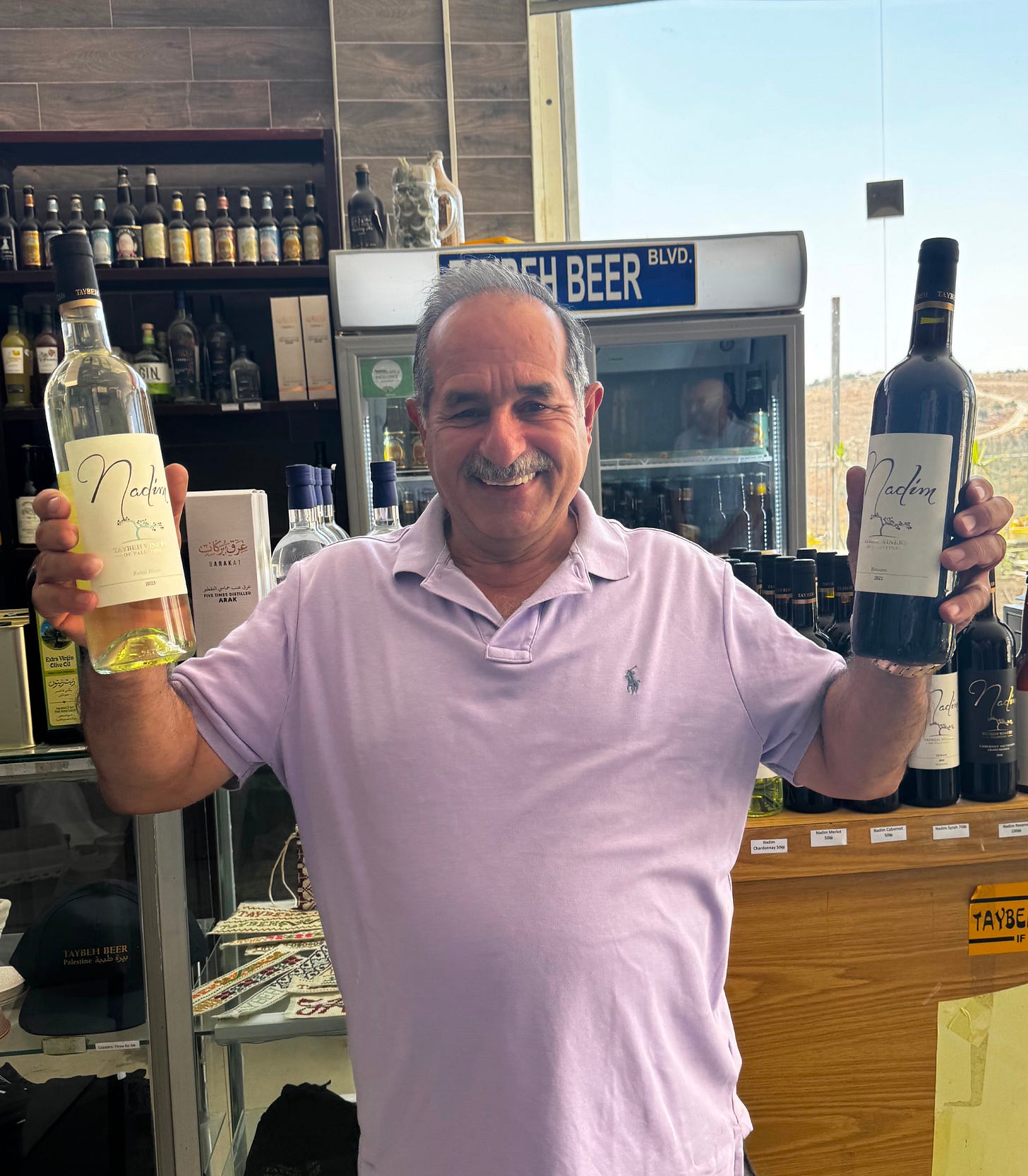
P.S.: Inside Taybeh’s Melkite church
After surveying the burned land, Abuna Jacques-Noble Abed took us into his nearby Melkite church. We were curious, having never been deep inside one, and Abuna Jacques was a jolly, deeply spiritual man—the kind of person whose very presence makes you want to draw closer to God.
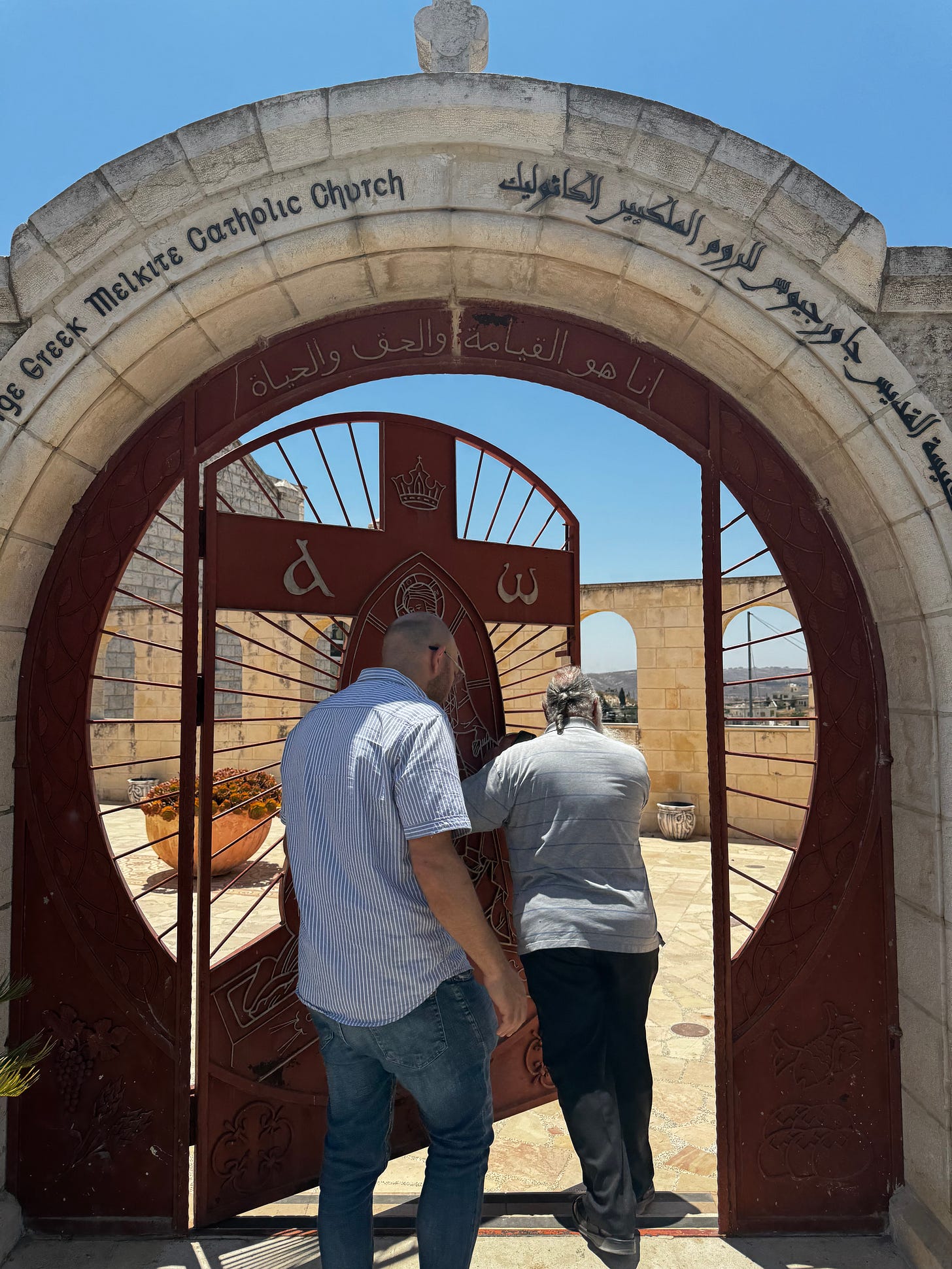
“This is Heaven’s Door,” Abuna said, waving his hand reverently towards the iconostasis, graciously allowing me to knock on it and sing a bit of Dylan.
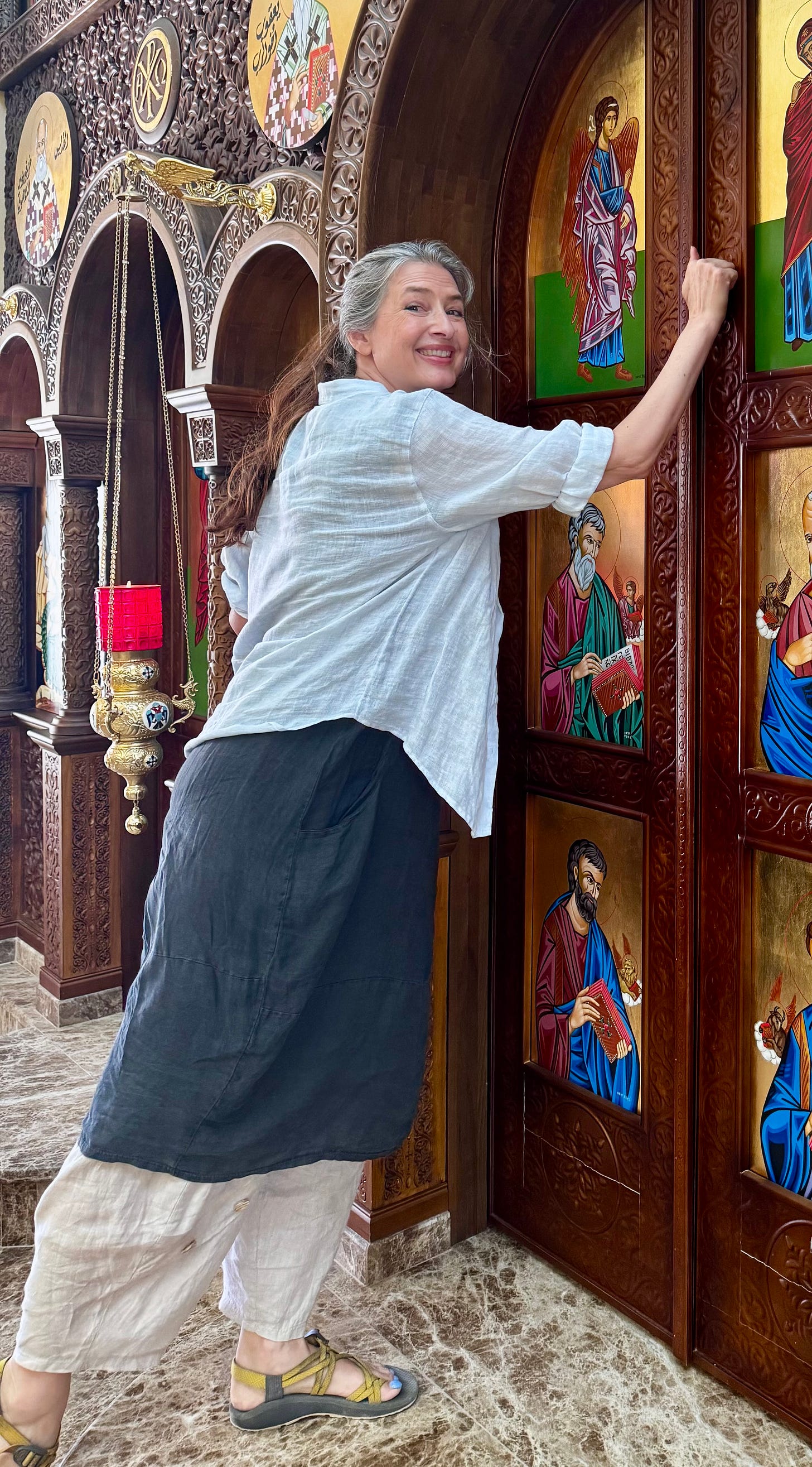
Then he took us behind the iconostasis, into the holy of holies, where a bit of sanctified bread is always kept inside a dove suspended over the altar. He spoke about the unity of the Body of Christ between East and West, equality between male and female. He talked about the way of Jesus, his transfiguration and ours—if we continue to follow him through his life and death and resurrection. I’d been reading Ezekiel, and as he spoke I saw wheels within the wheels all around the church, the four living creatures. For a moment, I felt as though we were surrounded by chariots of fire.
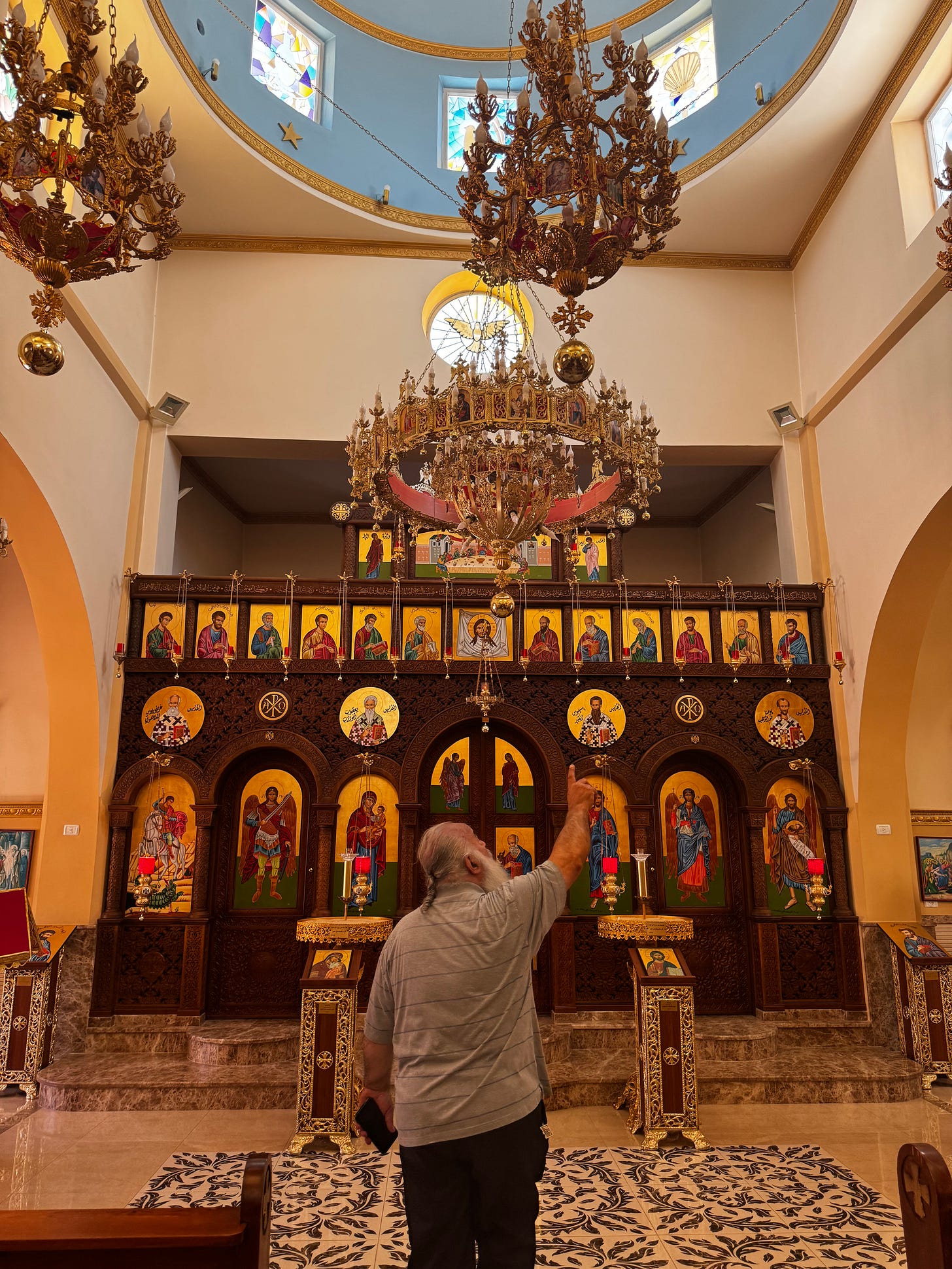
Maybe it was the thought that Jesus once retreated here. Maybe it was the nuns who showed us the old Parable House in Taybeh earlier that day, with a place for animals beneath and an upper floor for the family—local families living as they had since biblical times—and a sense of the deep history of this little village. Maybe it was the fires within us and the fire-starters roaming outside.
The fire was part lament that so much of the organic history of the Holy Land continues to be wiped out by an aggressive movement that seeks to claim sole heritage to these ancient biblical stories, lament that this paradigm of religious exclusivity has robbed all of us of a deeper richness that could only enlighten and bless us all.
But in the lament was also a fire of worship, because despite all of this, the wheels within the wheels were spinning and the dove was flying and the tradition here was alive and burning in the heart of the local priests. A different fire than the strange fire offered by poor, destitute Menahi and his morally-deluded followers, and all those who think that by blessing them, they are blessing God. They, of all the people around Taybeh, are the most at risk of another kind of fire—that of judgment. I am being very serious when I say, let us pray for them to repent from their violence, entitlement and delusions of grandeur.
And let me repeat: Taybeh (and all that remains of Palestine) is under repeated attack and we will lose it without international intervention. They have issued a call for help. Will we answer? The intervention must not be merely against a few of the most radical settlers, but against the settler movement and its accompanying occupation and apartheid, which is backed by the state of Israel, which is backed by the United States—the global empire.
Let us pray for the protection of Taybeh, that the holy fire will remain in the hearts of the faithful, even if they face martyrdom. I have seen the difference between saints and sinners in the land—and Taybeh is one such place that makes this distinction very stark.
Original article: mercyaiken.substack.com








